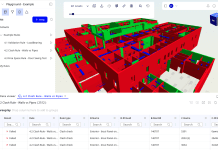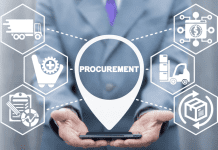Pioneering technology reshapes construction procurement, promising streamlined processes and transparency—discover how these innovations revolutionise the industry
Technology plays a crucial role in transforming modern construction procurement, introducing efficiency and transparency across various stages. Online procurement platforms streamline processes, enabling electronic bidding and automation, while digital document management guarantees agile project oversight through real-time sharing.
Building Information Modeling (BIM) enhances coordination and provides detailed project visualisations. Effective supply chain management and predictive analytics drive timely material delivery and data-driven decisions. Mobile technology and advanced communication tools facilitate seamless interaction and real-time accessibility. Additionally, blockchain guarantees secure transactions, promoting accountability.
As technology evolves, embracing these innovations improves procurement strategies and outcomes greatly.
Online procurement platforms
Innovation in procurement is exemplified by the rise of online procurement platforms, which have revolutionised how construction companies manage their procurement activities. These platforms facilitate a seamless approach to project posting and electronic bidding, allowing for a more dynamic interaction between construction firms and suppliers. By integrating e-procurement systems, companies automate critical processes such as requisition, sourcing, contract management, and supplier interactions. This automation not only streamlines operations but also enhances transparency through performance tracking, thereby fostering stronger supplier relationships.
The advantage of cloud-based systems in this scenario cannot be emphasised enough. They provide construction companies with the freedom to access documents and collaborate with stakeholders from virtually anywhere. This flexibility ensures that all parties involved in the procurement process are aligned, thereby improving communication and decision-making. The agility afforded by cloud technology reduces delays and enhances overall project delivery, making it an essential component of modern procurement strategies.
Moreover, the incorporation of electronic signatures has further streamlined the signing of contracts and other procurement documents on these platforms. This feature eliminates the need for physical paperwork, expediting the approval process and reducing the administrative burden. Electronic signatures not only save time but also add a layer of security and authenticity to transactions, guaranteeing that contractual obligations are met efficiently.
Digital document management
Digital document management is an important component of construction procurement, transforming how project documentation is handled and shared. This modern approach offers easy access to vital documents, guaranteeing that stakeholders can collaborate effectively without the constraints of traditional methods. By leveraging cloud-based systems, construction teams can access documents anytime, anywhere, promoting a more fluid and dynamic work environment. This increased accessibility fosters an atmosphere of freedom and innovation, allowing teams to focus on project execution rather than administrative hurdles.
Real-time access to project documentation is another significant advantage, allowing stakeholders to make informed decisions based on the most current data, reducing the risk of miscommunication and delays. This immediacy supports agile project management, where quick adjustments are often necessary to meet project goals and timelines. This not only accelerates workflows but also reduces the dependency on paper-based processes, aligning with sustainable practices.
By facilitating secure document sharing, digital document management systems guarantee that sensitive information remains protected, maintaining trust among all parties involved.
Building Information Modeling
BIM transforms construction procurement by providing a detailed digital representation of building projects that integrates 3D modelling, data management, and collaboration tools. This transformative approach enhances visualisation, streamlines coordination, and fosters communication among stakeholders, leading to improved efficiency and reduced errors in construction projects. By enabling clash detection, BIM identifies potential conflicts in the design phase, preventing expensive on-site adjustments and ensuring smooth progression through the construction lifecycle.
BIM’s capabilities extend beyond initial project planning and execution. The technology supports facilities management and lifecycle analysis, offering a thorough view that enhances long-term project sustainability and operational efficiency. Such insights are vital for decision-makers seeking to optimise resources and minimise environmental impact.
Supply chain management
Effective supply chain management enables seamless coordination and timely delivery of materials and equipment. In an industry where efficiency and cost-effectiveness are paramount, leveraging technology provides significant advantages. Real-time visibility into the movement of materials and equipment, facilitated by RFID and GPS tracking technologies, empowers construction companies to monitor supply chain activities with precision. This visibility guarantees that project timelines are adhered to, minimising delays that could increase costs and disrupt project flow.
Predictive analytics further revolutionises supply chain management by optimising inventory levels. By analysing historical data and forecasting demand, construction firms can maintain ideal inventory levels, avoiding the pitfalls of overstocking or stockouts. This predictive capability not only reduces costs but also enhances the responsiveness of procurement processes, allowing for agile adjustments in response to dynamic project requirements.
Digital collaboration tools play a vital role in enhancing communication and coordination among stakeholders across the supply chain. These tools facilitate seamless information exchange and decision-making, breaking down silos and fostering a collaborative environment. As a result, stakeholders can promptly address challenges and capitalise on opportunities, driving forward project success.
Communication tools
Communication tools stand as pivotal assets for facilitating live collaboration. These platforms are designed to enhance communication and collaboration among construction procurement teams, guaranteeing seamless interaction and effective decision-making. Their integration into the procurement process is not just a convenience but a necessity in today’s fast-paced industry landscape.
These tools enable instant messaging, file sharing, and video conferencing, which are essential for project tracking and coordination. This immediacy allows stakeholders to engage in real-time communication, expediting the flow of information and fostering a culture of transparency and responsiveness. Additionally, these platforms support remote work capabilities, allowing team members to access secure project data from virtually anywhere.
Data analytics and AI
Data analytics and AI are transforming how decisions are made and strategies are formulated. These technologies empower construction firms to break free from traditional constraints by enabling data-driven insights that guide strategic procurement decisions. Data analytics not only evaluate supplier performance but also uncover market trends, offering a holistic view of the procurement landscape. This depth of understanding provides procurement professionals with the autonomy to make decisions that align with broader organisational goals.
AI technology, on the other hand, enhances the decision-making process by predicting purchasing trends and optimising stock levels. By automating repetitive tasks, AI reduces human errors and allows procurement teams to focus on strategic buying decisions. This automation leads to significant cost-saving opportunities and improved efficiency, freeing up resources that can be redirected to innovation and development.
Moreover, advanced data analytics tools enable a transparent and efficient evaluation of supplier behavior. By offering insights into performance metrics, these tools facilitate enhanced supplier relationships and drive better negotiation outcomes.
Mobile technology
Mobile technology facilitates real-time communication and collaboration among project stakeholders. It empowers procurement teams with the ability to access procurement platforms and essential data, irrespective of their physical location. As a result, decision-making becomes more agile, enabling swift responses to dynamic project needs.
The integration of mobile technology into construction procurement introduces several key benefits:
- Enhanced data accessibility: Mobile devices grant immediate access to procurement platforms, allowing stakeholders to track orders, manage contracts, and monitor supplier performance efficiently.
- Real-time communication: With instant updates and notifications, project teams can seamlessly coordinate and share critical information, reducing delays caused by traditional communication methods.
- Streamlined processes: Mobile apps reduce paperwork and administrative burdens, leading to accelerated decision-making and improved overall efficiency.
Blockchain in procurement
Blockchain technology introduces a new era of security and transparency to the process. By embedding blockchain into procurement workflows, construction organisations can ensure secure, transparent, and immutable transactions, thereby establishing a foundation of trust among stakeholders. With smart contracts, blockchain technology automates procurement, reducing both time and costs while eliminating the need for intermediaries. This automation not only enhances efficiency but also speeds up procurement transactions significantly.
Blockchain’s decentralised ledger offers real-time visibility into procurement activities, which is pivotal in maintaining accountability and reducing the risk of fraud. This transparent approach empowers organisations by providing them with the freedom to make informed decisions quickly and with confidence.
Blockchain features |
Benefits in procurement |
Secure transactions |
Enhanced trust |
Smart contracts |
Automated procurement processes |
Decentralised ledger |
Real-time visibility |
Elimination of intermediaries |
Reduced costs and time |
Quality control innovations
Enhancing quality control in construction procurement is increasingly achievable through digital innovation. In today’s dynamic environment, the implementation of advanced technologies like data analysis and predictive analytics revolutionises the way construction projects are managed, guaranteeing that quality standards are not only met but exceeded. Digital inspection tools play a pivotal role in monitoring materials and workmanship, providing an efficient mechanism for compliance monitoring and issue resolution.
Key innovations in quality control include:
- Digital inspection: Tools that enable real-time monitoring of construction processes, ensuring materials and workmanship adhere to established quality standards and regulations.
- Predictive analytics: The use of machine learning to foresee potential quality issues, allowing for proactive measures that prevent disruptions and maintain smooth project execution.
- Data analysis: Advanced tools that analyse vast amounts of data to identify trends and prevent quality problems, maintaining high standards throughout the construction lifecycle.
Sustainability in procurement
Integrating sustainability principles is becoming increasingly essential alongside quality control innovations. Sustainable building practices are no longer optional; they are necessary for reducing environmental impact and fostering a healthier planet.
Green procurement strategies are at the forefront, aiming to minimise waste, promote recycling, and prioritise eco-friendly products. These strategies not only enhance energy efficiency but also support the attainment of significant environmental certifications such as LEED and BREEAM. By adopting sustainable procurement practices, construction firms align themselves with global sustainability targets like the UN Sustainable Development Goals, ultimately benefiting their reputation and bottom line.
The use of technology in sustainable procurement is not merely about compliance; it is about embracing an ethos that values long-term benefits over short-term gains.
| Aspect | Traditional procurement | Sustainable procurement |
| Material sourcing | Price-driven | Eco-friendly products focused |
| Waste management | Limited recycling | Emphasis on recycling |
| Energy efficiency | Often overlooked | Critical consideration |
| Environmental certifications | Rarely pursued | Actively pursued (LEED/BREEAM) |
| Long-term impact | Short-term cost focus | Long-term sustainability gains |














